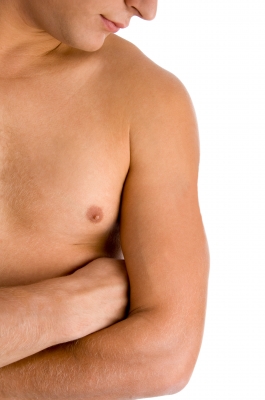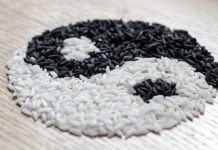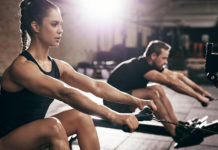by: Dr. Craig A. Maxwell
During October, there is no shortage of information on how women can protect themselves against breast cancer. However, it may surprise you to know that men can get breast cancer too. Though rare, there were approximately 2,240 new cases of male breast cancer diagnosed in 2013 with an estimated 410 men dying from the disease.
Breast cancer is far less common in men because their duct cells are less developed than that of their female counterparts. Men also have lower levels of female hormones that affect cellular growth in the breast.
Still, if you’re a man, a breast cancer diagnosis is possible. Even if you have no family history of breast cancer, it’s important you’re aware of your risk factors and what steps you can take to prevent this deadly disease.
Risk Factors for Male Breast Cancer
- Aging
As a man ages, his testosterone levels drop and his estrogen levels rise. This factor increases his risk of developing breast cancer. Though most incidents of male breast cancer occur in men over the age of 65, younger men may still be at risk.
- Family History
A family history of female or male breast cancer can elevate a man’s likelihood of developing the disease himself. This is largely due to inherited genetic mutations that can be influenced by environmental factors.
- Klinefelter’s Syndrome
Klinefelter’s syndrome is a rare genetic condition characterized by an extra X chromosome occurring in most of the cells. Men with this disorder often lack adequate levels of testosterone and have higher levels of estrogen. Symptoms of this condition include lack of facial hair, infertility, social problems, coordination trouble, and a type of male breast growth called gynecomastia. Men with Klinefelter’s syndrome are often at increased risk of breast cancer due to an increase in female hormones.
- Excessive Alcohol Consumption
According to a population-based European study, incidents of male breast cancer increased by 16% for every 10 g of alcohol consumed per day. It is believed that excessive alcohol consumption increases cancer risk because alcohol breaks down into a carcinogenic substance called acetaldehyde. This substance has been shown to contribute to genetic mutations, which can prompt your body to produce cancerous cells. Excessive alcohol consumption also leads to nutritional deficiencies, which can affect the ability of your immune system to fight cancer.
- Obesity
Overweight men are at increased risk for breast cancer because fat cells in their bodies convert androgens into estrogen. It is estimated that up to 15% of breast cancer cases can be attributed to obesity.
- Junk Food Diet
Highly-processed convenience foods contain an alarming array of chemical additives and preservatives that have been linked to the development of cancer. The popular chemical sweetener, aspartame, for example, has been shown to contribute to the development of several types of cancer in laboratory mice. Food dyes, which can be found in candy, breakfast cereal, yogurt, snack foods, ice pops, and over-the-counter medications, have been linked to cancer. Monosodium glutamate (MSG), a popular flavor enhancer in Asian food, has also been shown to increase cancer risk.
- Environmental Toxins
Incidents of male breast cancer have risen steadily every year since 1975. So has the use of toxic chemicals in the health and cosmetic products you use everyday. Everything from the shower gel you wash with to the underarm deodorant you use are filled with endocrine-disrupting and carcinogenic parabens, phthalates, and BPA that increase your risk of developing multiple types of cancers, including male breast cancer.
Symptoms of Breast Cancer in Men
- Lump or Knot in Breast Area
A lump or knot in your breast (pectoral) area could be indicative of early stage breast cancer. The lump is often hard and painless to the touch.
- Dimpling or Puckering of Skin About the Breast
Pay close attention to the look and shape of your breasts. Dimpling or puckering of the skin can be an indication of abnormal cellular changes occurring in your breast.
- Itching or Rash at the Nipple
Chronic itching of the nipple or a noticeable rash in that area is another common symptom of male breast cancer.
- Puckering of the Nipple
Puckering of the nipple may be indicative of Paget’s disease, a very rare form of breast cancer.
Preventing Male Breast Cancer
- Eat a Healthy Diet
The incredible array of toxic chemicals in the Standard American Diet is putting millions at risk for the development of preventable cancer. In order to remain healthy, active, and fit, you must feed your body the nourishing food it needs to function at its best.
This is why the first thing I recommend to all my patients is that they slowly wean off junk food and invest in whole foods. Organic vegetables and fruit, nuts, seeds, beans, meat, poultry, fish, cheese, eggs, and healthy fats like coconut oil and butter do wonders to improve your health and prevent disease.
Foods like onions, garlic, and turmeric have all been shown to have anti-cancer and anti-inflammatory properties.
- Clean Up Your Environment
Men who use conventional soaps, shampoos, conditioners, body sprays, and colognes may be at increased for the development of male breast cancer. This is largely due to the parabens and phthalates contained in these products. Clinical studies have shown that high levels of these endocrine-disrupting toxins have been found in breast cancer tissue.
The cleaning products and air fresheners you use in your home may also increase your cancer risk. These products often contain formaldehyde, a carcinogenic embalming agent that infiltrates your body through skin contact or inhalation.
One of the best things you can do to prevent the development of any kind of cancer is to cut these chemicals from your life. You don’t need them. You can clean and freshen your body and home just as effectively with natural alternatives.
Castile soap is an olive oil and essential oil-based soap that can be used as a body wash, shampoo, shaving oil, laundry detergent, and natural cleaning agent.
If you like to wear cologne, you don’t have to give it up completely but you should switch to essential-oiled based scents. Bay, cedarwood, sandalwood, and davana are all manly-smelling scents you can find online or make yourself at home.
- Do a Self-Breast Exam
Women aren’t the only ones who should be doing a self-breast exam. Men should make it a point to make to set aside one day a month to do a self-breast exam as well. Watch the video below for a step-by-step guide.
The Benefits of Performing Male Self Breast Exams — powered by ehow
- Maintain a Healthy Weight
Maintaining a healthy weight is ideal for the prevention of cancer, heart disease, diabetes, hypertension, sleep apnea, and more. You don’t have to starve yourself thin or turn to some low-fat diet fad to shed those unwanted pounds either. You just have to eat a cleaner diet and get a moderate amount of exercise each week. One of the easiest ways to lose weight is to cut all soda from your diet. Not only do additives like aspartame and high fructose corn syrup pack on the pounds, they’ve also been linked to the development of cancer.
- Restrict Alcohol Intake
According to the NIAAA, low-risk drinking for men is no more than 4 alcoholic drinks in one day and no more than 14 alcoholic drinks per week. Most men will have a more generous amount to drink when going out to dinner or to a club but then will not drink for several days afterward.
Though breast cancer in men is rare, it can happen to you or someone you know. Understanding your risk factors and taking steps to get healthier can greatly increase your chances of living a long, cancer-free life.
Resources:
http://cebp.aacrjournals.org/content/14/1/20.full
http://www.nichd.nih.gov/health/topics/klinefelter/conditioninfo/Pages/symptoms.aspx#physical
http://www.ncbi.nlm.nih.gov/pubmed/15280636
http://www.ncbi.nlm.nih.gov/pubmed/20886530
http://onlinelibrary.wiley.com/doi/10.1002/jat.958/abstract;jsessionid=F6A6F3BF6110B877911B19206FD48B72.f04t01?deniedAccessCustomisedMessage=&userIsAuthenticated=false
“Image courtesy of [imagerymajestic]/FreeDigitalPhotos.net”








